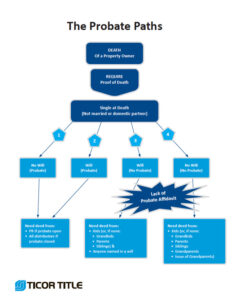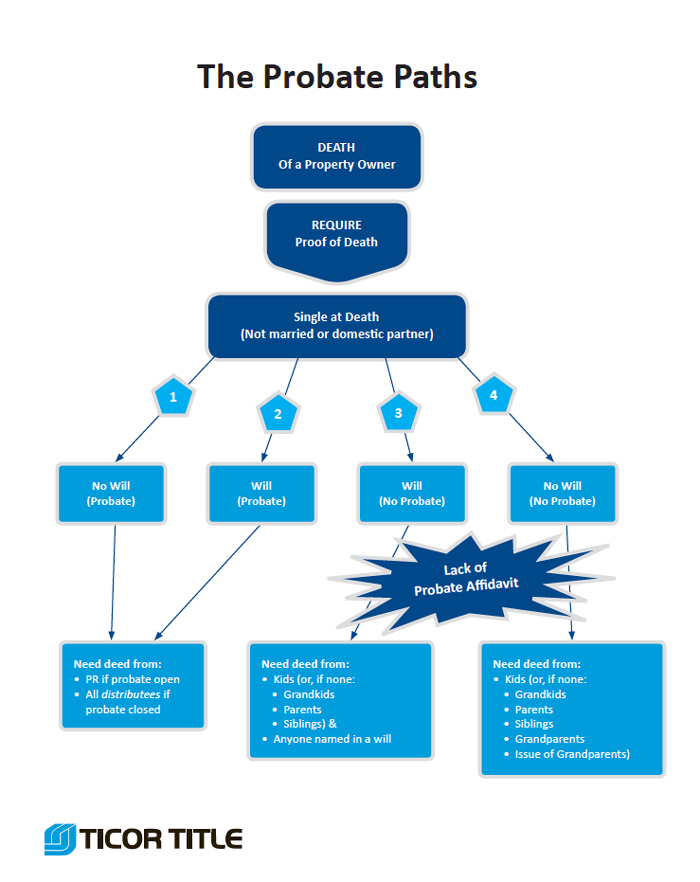Recent blogs have discussed probate issues, or problems associated with a “lack of probate.” If a home is to be sold but the record owner is deceased it is imperative to identify who now owns the property. The transaction can then close if the proper parties execute a deed to the buyer.
We are not talking here about joint tenancy or trust property, but rather where title was vested simply in an individual.
There are three basic situations when the owner has died:
- First, the owner was single – not married or a domestic partner.
- Second, the owner was married or a domestic partner, but it was separate property (not community property).
- Third, the owner was married or a domestic partner and it was community property.
Of course, each of these has additional variations, mostly relating to whether the deceased had a will, and whether or not the estate (with or without a will) is being probated. If there is a probated will, devisees (those named in a will) will get the property or the proceeds from the sale if it’s sold before the probate is closed. If there is no will, then state law provides who inherits. It can get complicated to work it all out.
It may be helpful in such cases to see a chart following the path to a successful closing. In this and future blogs we will show basic diagrams applicable to each situation. This month we start a fairly simple one – a deceased owner who was single at the time of death.
Deceased Owner – Single at Death
Sam Smith, a widower, just died. The home is listed by Rolf, who tells the Realtor® that he is Sam’s nephew and only heir. The title company gets the order and finds the death certificate, but doesn’t find a probate case. Having no other information at this time, the title company vests title in “the heirs and/or devisees” of Sam, and asks Rolf for a “lack of probate” affidavit. This affidavit is designed to identify relevant facts to allow the title company to assess its risk, including whether or not there is a will or a probate (which could be any county in Washington or in another state), the size of the estate (to determine if estate taxes apply) and other valuable information. The goal is to find out who can actually convey the land (and for escrow, who will get the proceeds of the sale), so that the risk is at least minimized, if not eliminated, that an unknown heir will come forward after the title has been insured.
No Heirs?
At some point, if there are no heirs at all, the home would eventually escheat to the State of Washington. In such cases, a probate may be opened, but here there are no easy answers. Usually creditors will open a probate and attempt to sell the property, with excess proceeds going to the state after the sale of the home.
Rolf completes the affidavit, and says that Sam never had children, and that his parents are also deceased. Sam did have a sister, but she is also died. She did, however, have an only son – Rolf who in turn is Sam’s nephew.
The laws of descent (RCW 11.04.015) provide that inheritance would be in the following order:
- Spouse, if any, or if none, then
- Children if any, or if none, then
- Parents, if alive, or if not, then
- Siblings, and if none survive him, then
- Grandparents, or if none, then
- Children or grandchildren of the grandparents and on down the line.
So, it would appear that the nephew is the sole inheritor and can sell the house. Now, it’s only the word of the nephew on the affidavit, but it is sworn under oath. It’s a judgment call on the part of the title company to decide the veracity of the nephew – is there a hidden will? Other heirs he’s just not mentioning? It is a risk, but the sworn affidavit is something for the title company to go on.
The chart below gives a simple guide to follow with these facts. There are four “paths” to follow. The first doesn’t apply, because although there is no will, neither is there a probate. The second doesn’t apply since there is neither a will nor a probate. The third doesn’t apply, because there is no will. So, we are left with the fourth path – no will and no probate. It requires the lack of probate affidavit, and a deed only from Rolf (as the sole surviving heir of Sam Smith, deceased), the child of a sibling, because Sam left no living kids, grandkids, parents, brothers or sisters.

